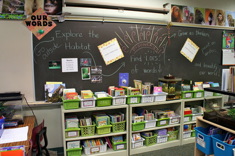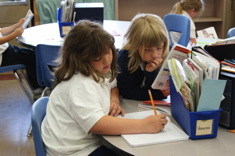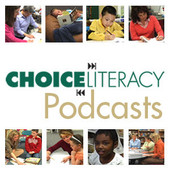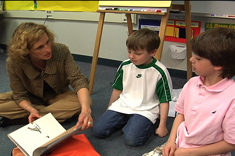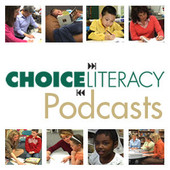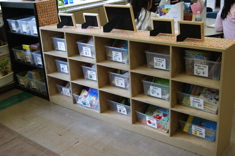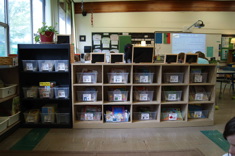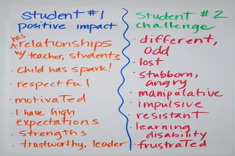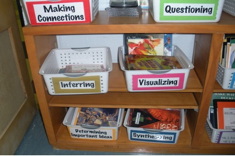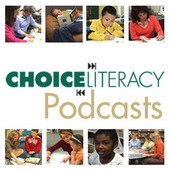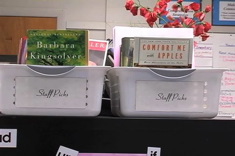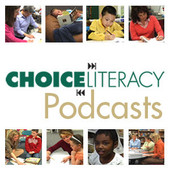Library
Choice Literacy Articles & Videos
The Choice Literacy library contains over 3,000 articles and 900 videos from 150+ contributors. Classic Classroom and Literacy Leadership subscribers have access to the entire library. Content is updated continuously, with five to six new features published each week.
Latest Content
Acquiring Knowledge Two or Three Strategies at a Time
Amanda Adrian knows that a teachers learning new skills need accurate and timely identification of what's next as support.
Organizing a Classroom Nonfiction Library with Students
Organizing nonfiction so that kids will gobble it up is an art. Andrea Smith knows how important it is to include students in this process.
No More Excuses: Reading Workshops in Nontraditional Middle and High School Settings
Think you don’t have enough time for reader’s workshop in your classroom? Worried that you don’t have enough books to go around? Feel like you just don’t have the space for it? What if you had students, but no classroom, no books, and no set class times? Ellie Gilbert faced down all these challenges in her nontraditional high school reading workshop.
A Poetry Cafe Celebration
Stella Villalba explains how her poetry cafe program brings families together for a festive event, and helps English language learners develop reading and fluency skills at the same time. This is the first installment in a two-part series.
Born Wonders: Tapping Student Interest in Animals, Babies, and Books
Cute Alert – what’s more adorable than babies or animals? Perhaps baby animals! Andrea Smith shares an addictive web resource that will instantly hook students of any age. It’s zoo postings of newborn animals from around the world, with many literacy connections.
Spring Reading Interviews (TEMPLATE)
Kindergartners may be too young for reading interviews early in the fall, but Mandy Robek finds spring reading interviews are an excellent bridge to families and summer reading suggestions.
Ubiquitous Venns, Watch Fors, and Leverage Points: Coaching for Depth
Heather Rader examines the use of Venn diagrams as a catalyst for thinking about how to coach for more depth in classrooms.
Mentor Texts to Help Students Monitor Their Actions
Mandy Robek has a delightful list of books that help students reflect upon and monitor their behavior in the classroom.
Knowing Students Beyond Test Data with Kathy Collins (PODCAST)
Yes, test data can tell us about students. And yes, there is much, much more. Kathy Collins emphasizes pulling back and getting a wider angle on students in this podcast.
Teaching Stamina Strategies to First Graders
Tammy Mulligan works with two seven-year-olds to teach them strategies for building reading stamina.
Strawberries, Fun, and Student Blogging
Andrea Smith evaluates the success of her new student blogging program.
An ESL Poetry Cafe Celebration (Part II)
Stella Villalba explains how her Poetry Cafe program brings families together for a festive event, and helps English language learners develop reading and fluency skills at the same time. This is the second installment in a two-part series.
Walk Arounds: Gathering Data to Test Assumptions
Do you have a tattler in your midst? Not a child, but a teacher complaining about the work habits of a colleague? Jennifer Jones explains her proactive use of walk-arounds to gather data and confront misconceptions.
Closing Out the Year Round-Up (PART 1)
Here are some fresh and fun ideas for Closing Out the School Year from Choice Literacy Contributors Aimee Buckner, Trish Prentice, Karen Terlecky, and Stella Villalba.
What Matters Most: A Conversation with Samantha Bennett (PODCAST)
Samantha Bennett is the author of That Workshop Book: New Systems and Structures for Classrooms That Read, Write, and Think, and works with teachers and literacy leaders across the country to create vibrant school learning communities. In this podcast, she chats with Franki Sibberson about what matters most in schools.
It May Be a Mess, But It’s Our Mess: Creating a Student-Organized Classroom Library
Jennifer McDonough explains why it’s important for her to share the sorting, categorizing, and labeling of texts with her students early in the year while organizing the classroom library.
Books with Overlooked Potential for Launching the School Year (and Ideas for Using Them with Students)
You know those books that cause us to say, “Aww…I love that book.” Well, the team at Literacyhead has us thinking about using old favorites in new ways.
The Power of Linking Words and Perceptions
Melanie Quinn relays a powerful practice for staff members to reframe language and perceptions while putting common labels for students in a whole new light.
Rethinking Mentor Texts
Shari Frost writes about the ways our perfectly organized bins may limit the teaching possibilities for many books. She takes readers step by step through her process of determining ways to use a sample mentor text to teach a multitude of lessons and strategies.
Sharon Taberski on Book Choice (PODCAST)
Sharon Taberski talks about the teacher’s role in helping students make smart and thoughtful book choices.
Coaching Reluctant Writers
Heather Rader describes how to use "wows and wonders" to reach students who say they hate to write.
From Hearing to Listening
Jennifer Jones finds there is a world of difference between hearing and genuinely listening to the teachers who come to her for support. She shares some simple questions she uses at the start of professional conversations to ensure she is providing the right kind of response.
Using Animated Short Films to Teach Inference
Here’s a problem many teachers share – students are far too literal when it comes to inferring while reading. Ellie Gilbert finds animated short films readily available on the web are a terrific tool for helping students move beyond literal interpretations of text.
Virtual Book Clubs for Teachers
It’s virtually possible to get together around a book without getting together at all. Shari Frost shows us how.
Books for Launching the School Year (and Ideas for Using Them with Students)
We all want students starting school with intention, confidence, community and more. These books from the team at Literacyhead can help.
Aimee Buckner on Nonfiction in Student Notebooks (PODCAST)
Aimee Buckner always has notebooks on her mind and we’re glad because she’s upping the nonfiction and modifying for specific learners’ needs. She’ll tell you more in this podcast.
Getting the Most Out of Visiting a Colleague’s Classroom (PODCAST)
Tammy Mulligan and Clare Landrigan talk with Franki Sibberson about strategies for getting the most out of observing in a colleague’s classroom.
A Bad Case of the Never-Ending Januaries
With a tough winter and tougher budget prospects, many schools will be dealing with the Januaries straight through March. Our contributors have suggestions for dealing with stress, fatigue, and depression to help renew and re-energize your work.
Prewriting is a Party!
Sometimes the most important work for writers takes place before any actual drafting. Heather Rader shows how a simple metaphor can help students understand the importance of planning and organizing drafts.
One Book/Four Hands: Mentoring Younger Readers Using Picture Books
Paul Hankins describes the power of pairing high school and elementary students in a partner reading program.
Browse Content By
Type
Category
- Assessment Tools
- Big Fresh Archives
- Booklists
- Choice Numeracy
- Classroom Design
- Common Core
- Community Building
- Conferring
- Content Literacy
- Digital Literacy
- English Language Learners
- Equity
- Family Relations
- Free Samples
- Guiding Groups
- Leadership
- Literacy Coaches
- Mentor Texts
- Minilessons
- New Teacher Mentors
- Podcasts
- Poetry
- Quote Collections
- Reading Strategies
- Self Care
- Struggling and Striving Learners
- Talking and Listening
- Teacher Study Groups
- Teaching Reading
- Teaching Writing
- Word Study and Vocabulary
Author
- Melissa Quimby
- Nawal Qarooni
- Gwen Blumberg
- Julie Cox
- The Lead Learners
- Hannah Tills
- Josie Stewart
- Ruth Metcalfe
- Mallory Messenger
- Becca Burk
- Jodie Bailey
- Vivian Chen
- Mary Brower
- Tiffany Abbott Fuller
- Stephanie Affinito
- Ruth Ayres
- Leigh Anne Eck
- Heather Fisher
- Shari Frost
- Julie Johnson
- Suzy Kaback
- Gigi McAllister
- Shirl McPhillips
- Melanie Meehan
- Cathy Mere
- Debbie Miller
- Tara Barnett and Kate Mills
- Tammy Mulligan
- Dana Murphy
- Bitsy Parks
- David Pittman
- Brenda Power
- Heather Rader
- Matt Renwick
- Mandy Robek
- Christy Rush-Levine
- Gretchen Schroeder
- Jen Schwanke
- Brian Sepe
- Katherine Sokolowski
- Stella Villalba
- Jennifer Vincent
Grade Level
Choice Literacy Membership
Articles
Get full access to all Choice Literacy article content
Videos
Get full access to all Choice Literacy video content
Courses
Access Choice Literacy course curriculum and training


